|
|
|
Sort Order |
|
|
|
Items / Page
|
|
|
|
|
|
|
| Srl | Item |
| 1 |
ID:
133404
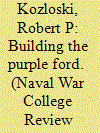

|
|
|
|
|
| Publication |
2012.
|
| Summary/Abstract |
Given the enormity of the U.S. national debt and the pressure to reduce Defense spending, surviving the forthcoming era of austerity will require innovative approaches to Department of Defense (DoD) organization and processes. Some of this innovation may require a reversal of previous efforts intended to improve effectiveness and efficiency within the DoD. Preserving operational capacity must be the top priority in any budget-reduction discussion. Unfortunately, the current approaches advocated within the Pentagon, on the Hill, and by influential Beltway think tanks call for reducing spending by trimming inefficient processes, eliminating end strength, and terminating costly acquisitions programs.
|
|
|
|
|
|
|
|
|
|
|
|
|
|
|
|
| 2 |
ID:
130618
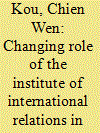

|
|
|
|
|
| Publication |
2014.
|
| Summary/Abstract |
In the past six decades, Taiwan's China studies have undergone a gradual shift from a focus on policy analysis and political introduction to one that is centred on scholarly research with policy analysis as its secondary aim. During this process, the role of the IIT has shifted from that of a government think thank, monopolizing China studies and serving the top brass jointly with other state-dominated research units, to a competitor for academic achievement and policy influence in a pluralistic academic and political market.
|
|
|
|
|
|
|
|
|
|
|
|
|
|
|
|
| 3 |
ID:
130615
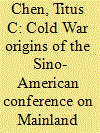

|
|
|
|
|
| Publication |
2014.
|
| Summary/Abstract |
this article adopts a reflexive approach to investigate the history of the Sino-American Conference on mainland China (SACMC), the Cold War precursor of the Taiwan - US Conference on contemporary China (TUSCCC) organized and hosted by the institute of international relations (IIR) of the republic of China , the Cold war origins of the SACMC demonstrate the nation that power and knowledge- the practice of politics and theory of politics are asymmetrically and symbiotically co-constitute.
|
|
|
|
|
|
|
|
|
|
|
|
|
|
|
|
| 4 |
ID:
163363
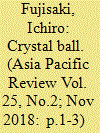

|
|
|
|
|
| Summary/Abstract |
Upon appointment as executive of Nakasone Peace Institute in the 30th year since its establishment, NPI President Ichiro Fujisaki discusses his view of the role of a research institute and outlines the aims for NPI going forward.
|
|
|
|
|
|
|
|
|
|
|
|
|
|
|
|
| 5 |
ID:
137504
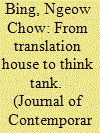

|
|
|
|
|
| Summary/Abstract |
The Central Compilation and Translation Bureau (CCTB), a key research organ of the Chinese Communist Party, has received little attention from scholars inside or outside of China. Originally an authoritative translation house for classical Marxist works, in recent years CCTB has gained more prominence as a policy think tank. Among its leaders are well-known advocates for political reforms and democracy. This article examines the institutional evolution of CCTB. It will discuss what factors are involved in how CCTB has evolved, including the role of its leadership and the changing political context in China; and it will examine how CCTB reconciles its seemingly contradictory roles of being a Marxist translation house and a pro-reform think tank.
|
|
|
|
|
|
|
|
|
|
|
|
|
|
|
|
| 6 |
ID:
119949
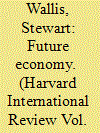

|
|
|
| 7 |
ID:
107296
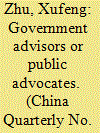

|
|
|
|
|
| Publication |
2011.
|
| Summary/Abstract |
Think tanks in China simultaneously play advisory, academic and advocacy roles in the policy process. In this article, I recommend an analytical framework that evaluates think tanks by studying their specific activities in addition to their nature. Empirical data involving 301 think tanks in 25 provinces were collected through the China Think Tank Survey 2004. The 1998 regional Integrated Knowledge Development Index database was also used for the analysis. Based on these two independent sets of survey data, the article concludes that connections with the government and knowledge capacity in regions where think tanks are located are the two differing forces that drive China's think tanks to operate as either advisors or advocates. Moreover, these two determinants differentially influence the individual roles of the two types of think tanks.
|
|
|
|
|
|
|
|
|
|
|
|
|
|
|
|
| 8 |
ID:
131445
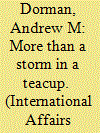

|
|
|
|
|
| Publication |
2014.
|
| Summary/Abstract |
In September 2014 the people of Scotland will vote on whether to become an independent nation, with the defence and security of Scotland proving to be one of the more vociferous areas of debate. This article argues that defence and security implications of this referendum are far more fundamental than either the 'yes' or 'no' campaigns have admitted. It makes four points. First, it suggests that the Scottish government's plans for defence and security in NATO and the EU are at odds with its proposed armed forces and that Scotland may well find itself having to make far greater commitments to defence to assure its allies. Second, it argues that a vote for independence will represent a game-changing event for the remainder of the United Kingdom's defence and security, which will have significant consequences for the United Kingdom's partners and allies in NATO, the European Union and elsewhere. Third, the article contends that even a vote against independence will have a long-term impact, in that the 'West Lothian question' and Scottish support for nuclear disarmament influence the 2015 Strategic Defence and Security Review. Finally, the article highlights how this issue has revealed weaknesses in the think-tank and academic communities, particularly in Scotland. The independence vote does, therefore, represent 'more than a storm in a tea cup' and thus there needs to be far greater engagement with these issues within the United Kingdom and elsewhere
|
|
|
|
|
|
|
|
|
|
|
|
|
|
|
|
| 9 |
ID:
116401
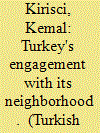

|
|
|
|
|
| Publication |
2012.
|
| Summary/Abstract |
This article argues that a synthetic look at different dimensions of Turkey's engagement of its neighborhood, be it movement of people, civil society interactions and economic exchanges, offers a better understanding of both the broader context within which Turkey's foreign policy is changing and the precise modalities through which this transformation is taking place. This engagement offers a range of opportunities from assisting neighboring countries, including the Arab world, to reform and modernize economically as well as politically to nudging the neighborhood to seek greater interdependence, dialog and cooperation. This would be promising in terms of "win-win" outcomes for Turkey, the European Union (EU) and the region. Such an interdependent and integrated neighborhood around Turkey could unleash economic, social and political processes that may eventually lead to a "democratic peace" in the region even if it might be in the very distant future. However, a number of tough challenges from reinvigorating democratization in Turkey and revitalizing EU-Turkish relations to stubborn regional conflicts would have to be addressed. Governments as well as civil society, academia and the think-tank world ought to start to think about what to do with these challenges.
|
|
|
|
|
|
|
|
|
|
|
|
|
|
|
|
| 10 |
ID:
116360
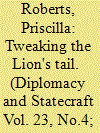

|
|
|
|
|
| Publication |
2012.
|
| Summary/Abstract |
In its first 2 decades the Canadian Institute of International Affairs (CIIA), Canada's premier foreign policy think tank, never functioned merely as a neutral and apolitical research organization. Under the leadership of Edgar Tarr, president of the Monarch Life Assurance Company, and in its capacity as the Canadian Council of the transnational Institute of Pacific Relations (IPR), in the 1930s and 1940s the CIIA became an instrument that championed Canadian national autonomy and sought to expand Canada's international role, while challenging British imperialism, racism, and Anglo-Saxon dominance. Prominent Canadian diplomats and other officials were complicit in this enterprise, which reached its apogee at the IPR conference held at Mont Tremblant, Quebec, in December 1942. The CIIA's activities during this period revealed the porosity and imprecision of the boundaries in Canada between the state and non-state realms. Throughout World War II, DEA and other Canadian government representatives attended CIIA and IPR conferences as "official non-officials," effectively cooperating with private individuals in a network of purportedly non-governmental organizations that enabled Canada to exert leverage on the British government, reject British leadership, align itself with the United States, and secure a greater world role. CIIA leaders and Canadian officials also consciously encouraged nationalist forces in India, China, and Southeast Asia that sought to reject colonial rule and Western dominance. CIIA activities thus became part of a web of diplomatic interactions across a transnational network of think tanks within and outside the British Empire that had their own impact upon international affairs.
|
|
|
|
|
|
|
|
|
|
|
|
|
|
|
|
|
|
|
|
|